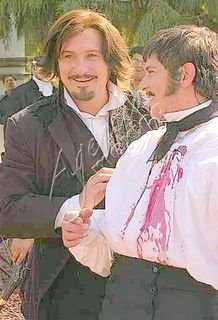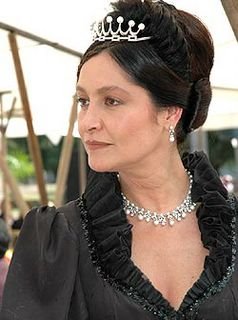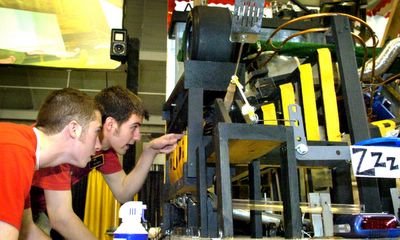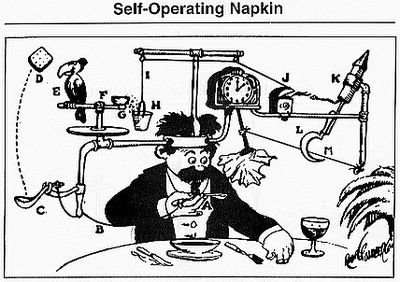Mike does Illustration Friday - "Under the Sea"

We had our painting session this afternoon. Mine looks like wallpaper so unless I have a brainstorm I'm not posting it. This is Mike's.
Technorati Tags: Illustration Friday
Labels: art


Labels: art
Yesterday's gig was casual. Foster's Restaurant has a narrow lawn covered with picnic tables sandwiched between the building and a busy street. We sat up under the lovely portico and played to a small audience which included the Moomin Light family (it's so much fun to meet blog friends) and a few more internet acquaintances as well as real-life friends and strangers.
Labels: music
Zed, my son at Wesleyan, sent me the schedule of events for his dorm's outdoor festivities today. Doesn't this make you nostalgic? So while I'm fiddling my fingers off, he'll be here:
Sun Live Music Live (cooked) food Green, green, lush-green grass Dance T-shirt stenciling (bring yourself some shirts!) Four-square Frisbee Butts merchandise (t-shirts, etc.) Bizarre free drinks in market-testing phase Only special biodegradable plates, cups, etc (awesome) Dirty feet Clean souls Aaron running a kissing-booth for ... charity ETC!!!!!! |
From Present Simple, one of my favorite blogs, written by Badaunt, a New Zealander teaching ESL in Japan
Found at Pub Rants:
Watch Melinama and Bob play without paper! The Pratie Heads at Foster's Market in Durham, NC Saturday, April 29, 4-6:30 pm 2694 Durham-Chapel Hill Blvd (489-3944) http://pratieheads.com |
Yesterday started with a bat bouncing around my room at 5 am. Perhaps she was the founding mother of this year's maternal colony.

 This is the first picture I ever took of Menticia in which I caught her laughing! Success! I snapped it as she worked on her South Carolina report. The way they do it, these days, there's a long list of required data, for instance:
This is the first picture I ever took of Menticia in which I caught her laughing! Success! I snapped it as she worked on her South Carolina report. The way they do it, these days, there's a long list of required data, for instance:Labels: mentoring
Last night was the annual Yom HaShoah (Holocaust Remembrance Day). (Here is Wikipedia on Yom Hashoah and here is another relevant site and here is my 2005 post.)
Last week, when it hit 80 degrees and the sun was shining, I took the day off work to go to the beach. I picked Fire Island because it looked cool, and was far away from New York, yet it seemed you could get there on public transportation.





Labels: hannah
I heard this joke at the end of an episode of Hill Street Blues, which I was watching while I worked out.
An ant and an elephant make love all night. Next morning, the ant wakes up and finds that the elephant is dead. "Damn," says the ant, "one night of passion and I spend the rest of my life digging a grave!" |
From The Quotations Page:
From the lovely "Prepare to Meet Your Bakerina," this post:
When life hands you lemons, make lemon pie
For someone who spends every blustery subzero February singing to the universe to bring spring forth already, I have not been adjusting well to spring this year, dear friends.
I had thought that the arrival of longer days, bright yellow sunshine and ridiculously-saturated blue skies would have been just the thing to clear winter's cobwebs away, but instead all that sunshine has done is illuminate just what a poor job I've done keeping those cobwebs from forming in the first place.
It's not that there is anything wrong, outside of the usual collection of irritants and whimsies of which life consists; it's just that my attitude about it all has been so terrible. To call it pessimism is to miss the mark slightly: not only is the glass half-empty, but if I had been a better person I would have remembered to buy more water so that the glass could always remain full.
...if there is one thing worse than morose torpor, it's realizing that you have given up the past week/six months/ten years of your life to morose torpor.
 Well, friends, my marathon project of blogging the five-day-a-week telenovela Alborada has finally ended.
Well, friends, my marathon project of blogging the five-day-a-week telenovela Alborada has finally ended.
 What an amazing experience it must be for telenovela actors. A typical production comprises about 80 hours, somebody wrote. That's got to be months and months of spending all day long with your fellow actors, in beautiful clothes, creating, but also living, an intense fantasy.
What an amazing experience it must be for telenovela actors. A typical production comprises about 80 hours, somebody wrote. That's got to be months and months of spending all day long with your fellow actors, in beautiful clothes, creating, but also living, an intense fantasy. Another funny thing about my new visitors is that they really let themselves drool over the protagonist (left). A couple times the producer let this guy take off his shirt and show his (anachronistic) big muscles. My readers fell off their chairs, they told me...
Another funny thing about my new visitors is that they really let themselves drool over the protagonist (left). A couple times the producer let this guy take off his shirt and show his (anachronistic) big muscles. My readers fell off their chairs, they told me... There is a grand showcasing in the telenovelas of an old-fashioned, regal kind of acting - usually portraying the villains and villainesses - which was born on the stage, centuries ago. I enjoyed it very much. Our gringo villains are rarely so impressive, rarely drenched in blood, their heads held high, giving wonderful speeches completely lacking in remorse!
There is a grand showcasing in the telenovelas of an old-fashioned, regal kind of acting - usually portraying the villains and villainesses - which was born on the stage, centuries ago. I enjoyed it very much. Our gringo villains are rarely so impressive, rarely drenched in blood, their heads held high, giving wonderful speeches completely lacking in remorse!
This is why I love Language Log. Josh Fruhlinger at the Comics Curmudgeon had posted this picture and this commentary:
So this is the cookie aisle, right? And all the boxes are arranged on the shelf so that their fronts, with their lovingly detailed close-up pictures of delicious, delicious cookies, are turned so as to be largely invisible to hungry shoppers, while their sides, with detailed information about the massive amounts of fat, industrial chemicals, and animal byproducts in said cookies, are prominently displayed for all to see. Plus, the boxes are all a muted brown. Where do these people shop, the Depressing Store?
Also (and this next paragraph is an extended shout-out to my professional linguist homies over at the Language Log, who have linked to me several times despite my near-total absence of linguistics content), I’ve always found the verb construction Mom’s deploying here pretty stilted and weird. It’s a verb of being governing a negative infinitive, which makes it … well, hell, if I knew that, I’d be writing "I analyze syntax so you don’t have to," or, you know, the Language Log, instead of this thing. I reached back a decade and rummaged around my half-remembered memories of Latin for a while and came out with the phrase "hortatory subjunctive," but I don’t think that’s right...
As far as I know, [this construction] doesn't have an established name in traditional grammar. The OED gives sense II 11b. for to:
Expressing duty, obligation, or necessity. (a) with inf. act.: is to..= is bound to, has to.., must.., ought to...
and gives these citations, among others:1591 SHAKES. Two Gent. II. iii. 37 Thy Master is ship'd, and thou art to post after with oares.
1598 -- Merry W. IV. ii. 128 You are not to goe loose any longer, you must be pinnion'd.
1887 'L. CARROLL' Game of Logic i. §1. 9 What, then, are you to do?
And CGEL distinguishes among six uses of be (p. 113):
- She was a lawyer. [copula be]
- She was sleeping peacefully. [progressive be]
- They were seen by the security guard. [passive be]
- You are not to tell anyone. [quasi-modal be]
- She has been to Paris twice already [motional be]
- Why don't you be more tolerant? [lexical be]
The be in iv is called "quasi-modal" because it "has clear semantic affinities with the central modal auxiliaries, and syntactically it resembles them in ... [that] it can't appear in a secondary form:It lacks all the other modal auxiliary properties, however..."
- I resent being not to tell anyone
- The meeting had been to be chaired by the premier.
So I guess the right terminology would be something like "quasi-modal be with an infinitive of obligation" ...
[In the CC comments section, Jimmy says "Thel should have said you weren't to open those until we got home," which is a usage of the Past Future Perfect Laudatory Declamatory Tense Twice Removed...
and Scipio tries heroically to assimilate it to Latin: "I think what you're searching for is negative future passive participle, specifically,
"tibi non aperturum est donec domi revenerimus."
"it's not to be opened by you until we shall have returned home."
FRIENDS: the current plan is to migrate the telenovela adventure to http://caraycaray.blogspot.com starting with Jean's recap of the Cristina show appearances of the Alborada cast. We are going to pick up with Barrera de Amor, the new 9:00 novela, midstream. I have already posted the synopsis and the cast of characters, with commentary and pictures. There will be one more recap here, of the Friday finale, and then - we're off! But please come back here to Pratie Place to visit, anyway, OK? |
Ningunearme: "treat me like dirt [nothing]." |
Zed sent this one to me:


Las patadas de ahogados, son las peores: "The kicks of drowning men are the worst!" |
Hipólita watches another woman, a thief, being flogged. Then it's her turn. They drone away about her sin, the evidence, and her confession. They tear her dress down the back and start flogging. (At least the executioner is behind her so she doesn't have to see his ghastly fat belly hanging over his black leather belt.)
OK, that's it: Cristóbal gives the sign! Higinio and his gang surge forward! The dignitaries in wigs stand in astonishment!
And suddenly, Luis gallops up! "Let her go! I have her pardon from the Viceroy!"
Fray Alvaro doesn't believe the Viceroy really issued a pardon, and even if he did, the Church is a higher authority than civil government. Alvaro says, clear the way so the punishment can continue...
... but just then, up rides a guard: "Stop in the name of the Viceroy!" Here comes the Viceroy's carriage, and here is the Viceroy himself. He gets on stage and says "Faith can't win with cruelty, it wins with piety and understanding. The Inquisition has been abolished in Spain, and as of today, it is abolished here in New Spain too!" Alvaro is discomfited, Team Luis hugs. Luis helps Hipólita off the stage.
In a darkened bedroom, Modesta and Juana discuss the dramatic rescue, and Eloise's father's request that his daughter's marriage with Diego be annulled.
Juana: "Here are two letters, one for the regidor with my confession and the other is for Luis. I told the regidor you're not to blame for anything. After ... I hope you'll go back to your hometown. Asi es y asi sera. Juana drinks the poisoned wine, a rosary wrapped around her wrist. She kisses Modesta's hand.
Cristóbal tends Hipólita's wounds. Luis: "Forgive me for not getting there sooner." She says it was her proper punishment, he says it was cruelty. Dagoberto comes in and says: "Antonio is dying and wants to say goodbye to Hipólita." She hadn't known about his fight with Diego, and his attempt to lie for her to the regidor.
In his own dark room, Diego tells his servants to make his cushions comfy and bring him wine. "The doctor only wants you drinking infusions." "I don't care what that fool said, I don't want his disgusting potions, I want wine."
Here comes Modesta with wine ... very SPECIAL wine, Diego ..."Here, it will help you recover your strength." "See, you imbeciles? Bring me a whole bottle." He drinks, but it isn't the best vintage.... "This is dreadful, bring me the good stuff. ... How's my mom?" Evasively, Modesta replies: "Praying for herself and for you."
Perla's with Antonio when Luis and Hipólita appear. She retires, rather unwillingly; Luis and Antonio acknowledge each other with dignity and Luis retires too. Hipólita: "They told me what you did for me, Antonio, I appreciate it with all my soul." Antonio makes the final of his many deathbed speeches. "You earned it ... Diego promised (to retract) and then attacked me treacherously. ... You're at liberty now. I just wanted us to say goodbye so I could die in peace." "I'm sorry, I feel so guilty." "Let's be done with guilt and fault-finding, it was I who made the first mistake."
He continues with his self-analyzing (he talks like a guy who sees a shrink regularly): "You know what my problem has always been? I always sought the approval of others, first and foremost my mother and, later, you. It never occurred to me that the only one who had to approve of me was - me." She mentions others who've loved him. He interrupts and changes the subject: "You love Luis, I understand, he's a good man and he really loves you. But I, I also loved you, in my way." "I also love you a lot." "I know I don't have the right to ask this because I was never affectionate with Rafaelito, but my deepest desire is that you take care of my child." She says she will. They smile, hold hands, he dies. Por fin!
Just outside the deathbed scene, Perla complains again about Antonio inconveniently dying before he could give his name to the baby. "I'm a child of the earth, I never cared about name or family, but I hoped my child would have a decent life."
Luis crossly says she needs to do something about it herself, and she says she wants to. Marcos looks on, sort of hang-dog. I guess it's supposed to be love ... Perla contines: "Also, Antonio wanted me to marry a good man, but who would marry a whore who's carrying another man's baby?"
Voiceover of Juana praying in Latin; we cut to her not looking so good after drinking her poisoned wine. "Do you think it's time?" Modesta nods and puts Juana's tiara on her! We wouldn't want to die without our tiara, would we?
Juana and Modesta stagger down the hall to Diego's room. The servant reports: "He got the wine he asked for and now he's asleep." Juana: "All of you, get out!"
Diego's lying in his longjohns with his creepy white mask. Juana gets in bed with him! She gives her cane to Modesta, she won't be needing it any more!
She embraces the sleeping Diego, saying "Pardon me, my dear son - I couldn't allow you to face people's scorn. It was all my fault. I ask God's pardon, for both of us." She holds his mask over his face! Modesta cries quietly, head bowed in sorrow. The mask falls! A wonderful wind blows the curtains open and a beam of light falls across the bodies in the bed!
Now Modesta uses the creepy mask as a death mask - and we realize this scene was set up months ago...
Isabel arrives, barking that Diego and Juana must write a confession (that Luis is the true Count) and vacate the castle immediately! Modesta says "They're, uh, asleep" -- Isabel bustles right by and starts shouting at them. But they're dead, she soon discovers. She's really freaked!
Modesta gives Juana's letter for Luis to his servant and then sits with the Regidor as he reads the letter Juana sent him: "I exchanged the babies... [etc]" Modesta says: "I know the note says I'm guiltless, but it's not true, I helped the whole way. ... before the eyes of God nothing is hidden, nobody escapes, and now I put myself in your hands to be punished. Juana and Diego are now in front of the Creator - she asked me and I poisoned them, they're dead." Beyond indignant, he yells: "Put her in jail and then straight to the gallows, no trial for her!"
Luis and Cristóbal visit the corpses. Luis kneels. "Seeing them thus, I finally understand why she did what she did - she loved her son above everything." Cris thinks there was more to it - ambition? "We are complicated beings..." "They say death purifies, and I think it's true because all their anger is gone. ... All that's left to me is profound pain."
Luis reads Juana's note: "You always thought I didn't love you, but it isn't true. I was never an affectionate person, and I didn't want to enflame Diego's jealousy of you, but in this last moment of my life, I confess to you that I would have preferred a thousand times that you had been my son. I beg pardon for all the damage I did you, even though I know neither you nor your father will forgive me." He holds the note to his heart and then burns it.
Juana and Diego lie in state together, all in white, many important people in attendance at the funeral. Incredibly, their sins are never revealed -- after the Old Dude, Sara, and Dagoberto all tell the Regidor they were eyewitnesses to Luis being the Count, Regidor points out that a family as important as this one should suppress this sort of irregularity. Luckily, since Luis is the next Count anyway, there's no need to air the gossip... The Regidor gives Luis the special Count-of-Guevara beanie and secret handshake. There are manly hugs all round and brass fanfares. Cristobal gives his usual sanctimonious advice.
Elsewhere, Perla cries and asks Marcos to thank Luis for taking care of Antonio's funeral mass and burial. "Now I'm alone and pregnant..." "I always told you to count on me." They embrace.
THREE MONTHS LATER:
Felipe is ripping black crepe off his house. "Enough already with the mourning, I want us to be happy again." He's bought Carmela a pretty not-black dress that she can wear to Luis and Hipólita's wedding next day. She says she's happy at his side. They embrace quite fervently. He tells her she's beautiful. Aww!
Luis and Hipólita wed at last. These long crowd scenes are, I think, an opportunity for the cast to say goodbye and enjoy their last moments in the sun. Isabel wanted a bigger event. Felipe says he feels proud, like a father, whereupon Carmela tells him he will, in fact, be a father again - she's pregnant. There is a long, stupid dance in the plaza (no comparison to that magnificent ballroom scene in Amor Real).
Perla complains to Marcos: "I'm fatter every day." "And sexier!" AGAIN she complains about her child growing up "the child of nobody." Marcos: "I don't know how to say this. You know I've always liked you, and I understand your life - once you told me I'm not your type - but I'm a good, honorable man, the kind Antonio told you to find..." "But I'm expecting a child that's not yours." "I didn't know MY father, either, but Don Felipe took care of me, raised me, helped me, gave me affection -- why can't I do the same for your child?" "Why didn't I ever notice you?" "You did..." "I always had affection for you, Marcos."
Luis and the very pregnant Hipólita have some sweet kissies. My guess is that a lot of people complained to Ms. Estrada about there being no happiness for the protagonists at the end of Amor Real - in the last scene of that telenovela, Colunga was deposited, half dead in a wagon full of straw, at his love's farm after months or years of her thinking him dead! No kissies! That was no fun! So now, kissies.
Elsewhere, Asunción is bustling along saying "NO!" Francisco promises, "Everything's going to be different." "I don't believe you, I'm tired of your reproaches, your nastiness, your wine, everything! I've decided!" He barks, "You're not going! because you're my woman." "All you care about is the hacienda, you don't care about your son or daughter, I'll talk to them and explain what hell my life has been at your side, they'll help me." "If you leave, don't come back!" "I don't intend to come back." She drives off in a carriage! Hurrah!
More months pass. Hipólita has her baby. All the women are in the room exhorting. Catalina is scared but she wants to stay, to see what she has to look forward to. The guys are out in the hall, Luis is hyperventilating. It's a girl, and she's "completita." They name her Aurora, after Luis's mom.
Later, Asuncion tells Hipólita: "You're a wonderful woman, daughter - your determination and courage used to scare me but now I admire you. You're the best mother I've known - I'm sorry I didn't defend you the way you defend Rafael - forgive me for abandoning you, and for being such a lousy mother when you came to find me again."
Francisco shows up and wants to talk. Asunción crossly asks him what he's doing there. "I ask you to come back - I miss you, I need you - I never told you but I always felt affection for you." "You never showed it." "Hipólita and my son taught me a lesson."
Oh, how I continue to hate Francisco as he selfishly continues: "I don't want to live alone. Also, I'm your husband, I'm ashamed that you're living with your children." "That bothers me a little too - so I'll think about it. But at the first provocation, I'll come back to them forever." "I'll never give you reason to complain." "Also it's lonely out there, so I want to spend part of my time there and part here." He agrees.
Really, I'd prefer that she dress in black leather and put her spiked stiletto to his throat and whip him, but you can't always get what you want.
Last scene: It's a group baptism, I think, with a zillion people.
The producers rented a boatload of babies for this scene. Everybody has a baby. They spent extra to get those special, quiet, calm babies. The babies that come from the pod people.
In the crowd, Francisco gives Asunción a flower; seeing this, Isabel gets a little sneer of suspicion on her face, just as I do.
Lastly, Aurelio rushes up and gives news to Cristóbal, who immediately jumps up on the stage and delivers it to the crowd. "Ladies and Gentlemen, the struggle for independence has succeeded, we are a free country, Viva Equality!"
He, an aristocrat loaded with dough, looks happy about the revolution. But I have to say it - I really must - concerning equality: There is not much of it in evidence, not back then and not now, either!
But let's not be churlish! As our cast jostles happily, hugs, and enjoys their armfuls upon armfuls of eerily clean quiet babies, I bid you good night!
You can buy (cheap) souvenir cards I painted in honor of our Alborada adventure
Amor Real
Entre el Amor y el Odio
"Telenovela villains meet lurid, dreadful deaths"
Technorati Tags: Telenovela, Alborada, Novela, Summary, Plot